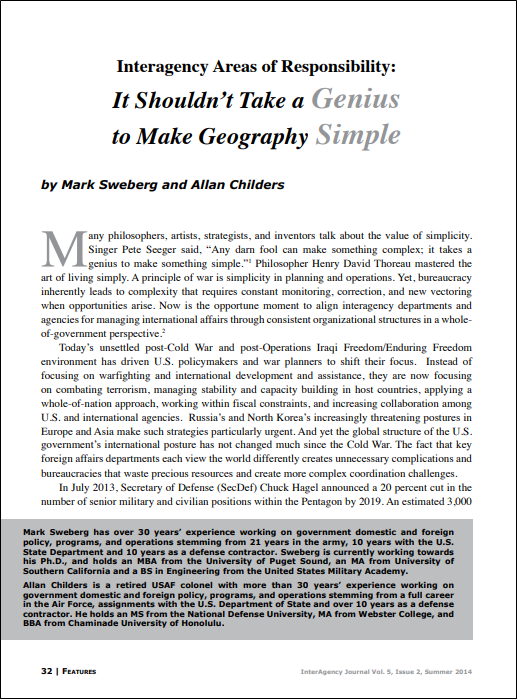Featured Article: It Shouldn’t Take a Genius to Make Geography Simple
Featured article:
Interagency Areas of Responsibility: It Shouldn’t Take a Genius to Make Geography Simple
by Mark Sweberg and Allan Childers
Many philosophers, artists, strategists, and inventors talk about the value of simplicity. Singer Pete Seeger said, “Any darn fool can make something complex; it takes a genius to make something simple.” Philosopher Henry David Thoreau mastered the art of living simply. A principle of war is simplicity in planning and operations. Yet, bureaucracy inherently leads to complexity that requires constant monitoring, correction, and new vectoring when opportunities arise. Now is the opportune moment to align interagency departments and agencies for managing international affairs through consistent organizational structures in a whole-of-government perspective.
Today’s unsettled post-Cold War and post-Operations Iraqi Freedom/Enduring Freedom environment has driven U.S. policymakers and war planners to shift their focus. Instead of focusing on warfighting and international development and assistance, they are now focusing on combating terrorism, managing stability and capacity building in host countries, applying a whole-of-nation approach, working within fiscal constraints, and increasing collaboration among U.S. and international agencies. Russia’s and North Korea’s increasingly threatening postures in Europe and Asia make such strategies particularly urgent. And yet the global structure of the U.S. government’s international posture has not changed much since the Cold War. The fact that key foreign affairs departments each view the world differently creates unnecessary complications and bureaucracies that waste precious resources and create more complex coordination challenges.
In July 2013, Secretary of Defense (SecDef) Chuck Hagel announced a 20 percent cut in the number of senior military and civilian positions within the Pentagon by 2019. An estimated 3,000 to 5,000 jobs will be cut from a bureaucracy that has heretofore shown remarkable resistance to cuts or even to a freeze on growth at the upper echelons. The Office of the Secretary of Defense (OSD) is again considering rearranging the combatant commands (COCOM) and their areas of responsibility.
Congressional efforts to cut the International Affairs budget have placed the Department of State (State) and U.S. Agency for International Development (USAID) in positions where they may also need to slash billets…
Read the full article
Interagency Areas of Responsibility: It Shouldn’t Take a Genius to Make Geography Simple PDF
Download the complete edition
IAJ 5-2 (2014) pdf
Mark Sweberg has over 30 years’ experience working on government domestic and foreign policy, programs, and operations stemming from 21 years in the army, 10 years with the U.S. State Department and 10 years as a defense contractor. Sweberg is currently working towards his Ph.D., and holds an MBA from the University of Puget Sound, an MA from University of Southern California and a BS in Engineering from the United States Military Academy.
Allan Childers is a retired USAF colonel with more than 30 years’ experience working on government domestic and foreign policy, programs, and operations stemming from a full career in the Air Force, assignments with the U.S. Department of State and over 10 years as a defense contractor. He holds an MS from the National Defense University, MA from Webster College, and BBA from Chaminade University of Honolulu.

Posted: November 7, 2018 by Simons Center
READ THE LATEST UPDATES FROM THE SIMONS CENTER
"*" indicates required fields


